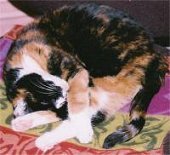Why get a cat?

Bringing a cat into your life, whether as a first pet or as an aH4ition to a multi-cat household, should only come after serious contemplation of the pros and cons. You will be making a major commitment, since adopting a cat means taking responsibility for that cat's well-being - both mental and physical - for the rest of the cat's life. and that, in these modern times of new diets and advances in medical care, can easily be 18 to 20 years. And some cats live even longer. So committing yourself to finding a pet-sitter every time you are away from home for the next two decades should not be a spur-of-the moment thing. If all your daughter's friends have a pet so she wants one, who is going to look after the cat when she goes to college?
This said, I hope that after reading this article you will be reassured that a cat can be a wonderful addition to your family. And there are many reasons why. Let's start with companionship because for many cat owners, this is by far the most important aspect.
Companionship
With so much else to deal with these days many people, especially professional couples, postpone starting a family until their careers are more established. In such circumstances a cat is a welcome recruit to the family. It is ever so nice to come home after a hard, stressful day and be welcomed by a friendly chirrup from the cat. Cats are masters at making a human feel welcomed and loved, especially if this encourages the human to put a good meal their way.
A good thing about cats is that they can be quite independent animals. For much of the day they can can look after and entertain themselves. This is especially true if you also have a garden where they can safely spend the time while you are at work. Cats are also very clean. Outdoor cats bury neat packets of, erm, fertilizer, in the flower bed, whilst teaching an indoor cat to use a litter tray is easy, and they (especially shorthaired cats) require minimal help in grooming.
If catch yourself halfway through having a conversation cat as though with another human, you share this weakness with most people who live with cats. Cats are great listeners. They like to watch you and listen to your voice. They may occasionally contribute a friendly miaow, to let you know they are still there and listening.
Of course cats are always great topic of conversation, especially with another cat owner. But if you find yourself talking mostly about or to your cat, it may be time to get out of the house more!
Comfort and relaxation
Cats are proven de-stressers. Just stroking a cat is very relaxing, and hearing the cat's purr will cause your tension to melt away. Quality time with your cat(s) gently purring away beside you or on your lap is definitely a life-enriching experience.
But cats are also great for providing entertainment. They like to play (especially younger cats) and they can be extremely amusing. If you have ever seen a cat chasing its own tail you know what I mean.
A cat will also provide comfort for people with irrational fears and anxiety. For example, many children are afraid of being left alone or in the dark. Having a cat sleeping next to them will reassure them and make their fears much less real.
Benefits to children
You have a busy life as it is, two children to look after, so why aH4 a cat? Have you not got enough on your plate already? Yet many, apparently sane, parents choose to add a cat to the family. The reason is that many cats are good with children. Children get enjoy playing with their pet cat. Both smaller children and teenagers like to confide their secrets to their cat - it's that being a good listener thing again.
Caring for a cat also gives children an early start in learning how to handle responsibility, and they often become more sociable as a result. Of course it is the parents' responsibility to make sure that the play is a suitable type, and that relaxed children do not come at the expense of a traumatized cat!
Benefits to elderly people
Cats are great companions for older people, especially when an elderly person lives alone. Looking after a cat can provide a focus to life and stimulate daily routine. Elderly people can sometimes be poor at looking after themselves, for example often forgetting to have regular meals. They are often much better caring and feeding their pets, but preparing food for the cat can get them to sit and eat their own meal as well. It is a pity that retirement homes do not always allow their residents to bring their cat with them, despite the complications this can cause. However, many retirement homes now have a cat or two in residence because the staff have found that they improve the quality of life of the residents.
'I am old and will probably not be around for the next 20 years'.
Many elderly people do not want a cat because they are afraid that the animal will outlive them, with no-one to care for it afterwards. Adopting an older cat may be a solution. Older cats by definition will live for a shorter time. They are also more sedentary and people-oriented. Many cats are prepared to spend a peaceful retirement snoozing on the sofa or settling on someone's lap for a evening of television viewing.
Therapeutic values
Finally there are also a medically-proven health benefits to owning a cat. Studies have shown that cat owners live longer, have fewer incidents of heart attack and have lower blood pressure. They suffer less stress and tension.
Many cat owners also point to the feel-good factor that comes from adopting and looking after a cat. Cat owners have also been shown to be better motivated (they have to be, especially in the morning, since the cat will no doubt remind you if breakfast has not been laid out yet).
It is no longer a secret that cats can provide a comfort and aid recovery of patients. This was nicely demonstrated by the British navy when a ship's cat called Simon was used by the doctor to keep injured sailors company, which helped their morale and recovery. If you do not know the story about Able Seacat Simon of HMS Amethyst, read the article which you will find in our library section.
There are now an increasing number of professionals who use animals, including cats, as part of treatment This relatively new field is called an animal associated therapy - AAT for short or AAA (animal associated activities). For example, there have been a number of positive reports on the use of cats in work with autistic children, particularly for those with motor co-ordination difficulties. Cats can also aid the recovery of patients with partial plysis, one example being physiotherapy with stroke patients.
Conclusion
No-one is saying that life with a cat is an idyll of uninterrupted bliss. There may well be disagreements about the shredding of the sides of sofas, and frantic trips to the vet. The unexpected hairball is something to which most cat owners are resigned. Yet despite the ups and downs, having one of these charming, enigmatic, and far from completely domesticated little creatures in your life brings a touch of magic to every day.

